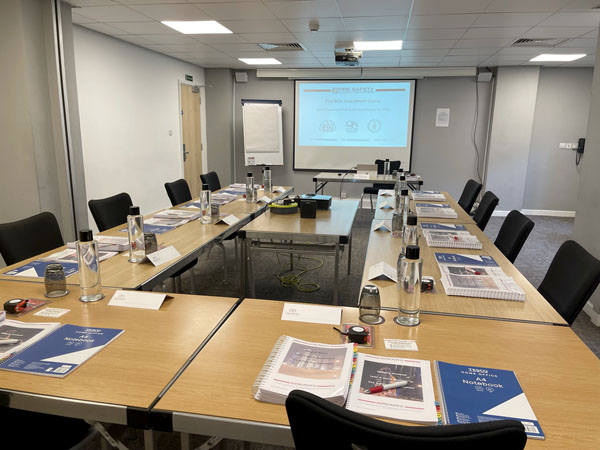Fire Safety

There is currently an abundance of career opportunities within fire risk assessment industry and with the release of the Fire Sector Federation (FSF) Approved Code of Practice for Fire Risk Assessor Competency in 2020 the need for fire risk assessors to have a qualification is becoming the norm.
Fire Safety Risk Assessment Consultancy Limited (FSRAC Limited) are currently offering a Level 3 Award Qualification in fire risk assessment awarded by Qualifications Network UK. It is possible to attain this qualification within a short period of time, typically less than one month.
The FSF and the fire risk assessment industry promote being a member of a fire safety related Institution and this qualification will enable you to become join the Institute of Fire Safety Managers (IFSM).
Demonstratable competence is becoming this norm within the fire risk assessment industry and one of the elements of being a competent person is being a reliable and responsible person; having been in the forces you will already be considered to have these qualities.
We have trained (or retrained) fire risk assessors from several industry leading companies including Mitie, Mears, Frazer Group and more.
The Level 3 Award in Fire Risk Assessment is a 5-day classroom course with a short portfolio of work to be completed in your own time afterwards. Completion of both parts of the course will result in a certificate being awarded by the awarding body, QNUK and as we are accredited by the Institute of Fire Safety Mangers (IFSM) are company certificate is also issued with the IFSM accreditation; a further certificate is also awarded by the Institute of Fire Engineers (IFE) for Continual Progressive Development hours.
Courses are delivered in Manchester by David Prince an ex-fire officer, fire safety inspecting officer, fire investigation officer and Nationally Accredited Fire Risk Assessor.
Our training courses are kept up to date with any updates in fire safety legislation included in the course; courses are constantly updated to ensure currency.
David Prince. MIFireE, MIFSM, FdSc, Tech IOSH, LCGI, Dip(Ed), Nationally Accredited Fire Risk Assessor Register (NAFRAR) No. 0151, FRACS (Fire Risk Assessor Certification Scheme) No. 73, Member of the UK-AFI (Fire Investigation).
Fire Safety Risk Assessment Level 3,
5-Day Course
Who is this 5-Day Course For:
This course is aimed at those who have a responsibility for undertaking fire risk assessments, reviewing and or implementing the significant findings of a fire risk assessment.
Typically, such persons would be
• Fire Risk Assessors,
• Health and Safety Manager,
• Health and Safety Advisor,
• Health Safety and Environmental Advisor,
• Building Facilities Managers and Facilities Teams,
• Managing Agents,
• Building Owners,
• Fire Alarm Engineers,
• Electrical and Mechanical Engineers.
Course content:
An Introduction to:
• ‘Fire Risk Assessment Competency Council Framework’
• Fire Science
• The Regulatory Reform (Fire Safety) Order 2005, (Fire Safety Legislation)
• Building Construction
• Fire Compartmentation (Passive and Active Fire Protection)
• Fire Doors, Final Exit Doors, and Door Security Devices
• Understanding and Calculating Floor Space Factors, Door Widths and Travel Distances.
• Means of Escape in the Built Environment.
• Understanding Escape Times
• Understanding Human Behaviour in Fire Situations
• Understanding Evacuation Strategies.
• Fire Alarm systems and BS 5839
• Emergency Escape Lighting and BS 5266
• Emergency Signage
• Firefighting Equipment
• to Fire Safety Management
• Understanding Fire Safety Training and the Legal Responsibilities.
• The Fire Risk Assessment Process.
• Understanding Fire Risk Assessment Significant Findings (Recommended Actions).
• Understanding when to Review the Fire Risk Assessment.
• Risk Reduction and Arson Prevention.
• Using relevant Fire Safety Guidance Documents (Home Office Guides, Approved D Document ‘B’ and BS 9999 are referred to throughout the course).
Why choose us?
•Our courses encompass the principles of fire safety risk assessment.
•Delegates will learn how the fire risk assessment process ‘pieces’ together with this course covering all of the necessary basic elements of a fire risk assessment.
•This course contains an update on building cladding types.
•This course aligns to the elements of the ‘Fire Risk Assessment Competency Council Framework
Previous course feedback:
John S. JJS. Limited “Excellent knowledge base and very well presented, a great course for aspiring fire risk assessors”.Grahame H. “Absolutely brilliant… exactly what I required”.
Jayne T. R and R Safety Systems. “Left me wanting more… excellent interaction and practical exercises”
Mark P. MPW Safety Solutions. “Excellent course. Well-structured and presented in a clear and logical way… highly recommended”
The course aligns to the Fire Sector Federation (FSF) Approved Code of Practice for Fire Risk Assessor Competency: Cross Mapping to RQF Level 3, EQF Level 4 or SCQF Level 6.
This course is aimed at fire risk assessor or those wishing to become a fire risk assessor wishing to undertake fire risk assessments of simple premises (as defined in the government guidance documents.
Extract from the FRACC Document: Competency Criteria for Fire Risk Assessors
Fire Risk Assessor Competency
Evidence of specialist training, membership of a professional body, and or certification by a third-party certificated body, need an appropriate knowledge of:
• The assessment of risk from fire (Appendix A)
• The applicable Legislation (Appendix B)
• Appropriate Guidance (Appendix C)
• Behaviour of fire in premises (Appendix D)
• Effects of fire on people and behaviour of people in fire situations (Appendix E)
• Means of escape (Appendix F)
• Fire Prevention (Appendix G)
• Fire Protection (Appendix H includes Passive and Active fire protection)
• Management of Fire Safety (Appendix I)
Learning Outcomes
By the end to the course the delegates will*:
•Understand how to assess the risk of fire in the built environment
•Be able to reference the Fire Safety Law for England and Wales
•Be able to reference appropriate guidance documents
•Understand the behaviour of fire in the built environment including ignition sources of fire
•Understand the effects of fire on people and human behaviour in fire situations
•Understand means of escape
•Understand fire prevention
•Understand fire protection (Passive fire compartmentation and Active fire systems)
•Understand the management of fire safety in the built environment.
*The course also considers how the delegate will manage their expectations regarding the fire risk assessment process.
Instruction methodology
The course uses a delegate workbook (the delegate keeps this for future reference), presentations and exercises which are interactively debriefed during the course.
Throughout the course delegates will complete the workbook exercises relevant to each presentation; delegates will complete a ‘mock premises’ fire risk assessment exercise (desktop exercise).
The course is assessable; with a multiple-choice test on the last day and completion of a portfolio of work to be completed within 10 working days of the end of the course.
Accreditation
Level 3 Award in Fire Risk Assessment (Qualification\Ofqual Registration Number 603/2073/4)
We are an ‘Institute of Fire Safety Managers’ (IFSM) ‘Accredited Centre’.
An ‘Certificate of Attendance’ Accredited by FSRAC Limited with ‘The Institute of Fire Safety Managers’ (IFSM) Accreditation.
The Course is also awarded 29 Hours of Continual Professional Development (CPD) with the Institute of Fire Engineers (IFE).
Course duration
5-Days 09.00 Hours to 17:00 Hours, with morning and afternoon breaks and 45 minutes for lunch.
This 5-day course includes a light lunch, teas and coffees, soft drinks and light snacks each day.
Cost of the Course
Those persons retiring from the forces can use their learning credits as payment for the course as we are registered to accept these.
Publicly Accessible Courses
The cost is £1195.00 per person plus VAT (£1434 Including VAT).
Courses are held each month at the same venue.
There are a maximum of 12 delegates places per course.
The Training Venue:
Training is held in the Manchester Conference Centre in Manchester. The address is, The Manchester Conference Centre located in The Pendulum Hotel, Sackville Street, Manchester. M1 3BB.
Start Time: 09.00 Hours (Tea and Coffee available each day from 08.30 hours in the training room).
Finish Times: 17.00 hours each day.

